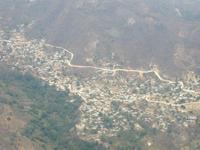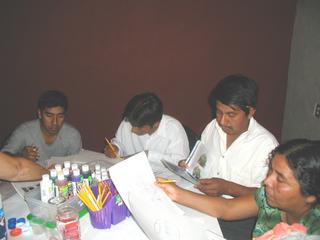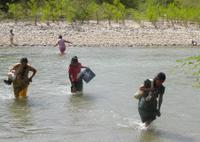
Lachiguiri is in the state of Oaxaca, one of the southern states of Mexico. It is nestled in sub-tropical rugged land, full of diversity and contrast. It is situated deep in the mountains of the Isthmus where the two mountain ranges meet and form the narrowest land between the Gulf of Mexico and the Pacific Ocean. The people have maintained themselves apart from most of the world and in most ways life goes on as it has basically for centuries.
The Zapotec people of Lachiguiri are one of over 42 languages, each dialect as different as Spanish is from Italian. In general, Zapotec people have a great distrust of outsiders. They did not always accept even other people from other Zapotec groups. It has taken Sheri many years to develop a trust among the Lachiguiri Zapotec people. At first they thought she had come to steal their language.
They are quite intelligent and hard workers. They grow coffee in the mountains and sufficient corn for their family’s subsistence. Their coffee ranches are three to six hours walk up into the mountains from the main village of Lachiguiri. Most of the people still walk to their land as the cost of a ride by bus or a truck is beyond their means.
Part of the year they may have avocados or oranges, bananas and other local fruit but most of the year they only have soup made from leaves that taste similar to spinach, tortillas and coffee. When possible they eat grasshoppers, iguana, eggs, beans and rice. They supplement this with wild herbs and greens. Jason, an agricultrist from Minnesota came in and taught them how to grow vegetables. Seeds are donated each year by a nursery in Prescott, Arizona. They save a hen for a fiesta or some may raise a goat or two for a special fiesta like a wedding. They always give their best when guest come such as medical teams from the states.
Fiestas are what they live for. A wedding fiesta or a fiesta for the worship of a patron saint may go on for several days or even a week. Since there is usually a lot of mescal served, tragically it is common to have the fiesta end with someone being shot over some minor insult.
The late Ernesto Dominguez the town cacique (rich landowner) provided the village with a school and a clinic. Usually a doctor who needs to do his internship comes to serve for one year at the clinic. Several of the recent doctors have a real love for the people and have stayed on to give extra loving care. There still isn't enough clinics to cover all the villages and each clinic serves about ten communities. Dental service is non-existent and a great need.
Since the people have so little money they have to work for the town doing "Tekio", sweeping streets or hoeing weeds in order to pay for their medical services or to pay for the education of their children in the government schools. Even the women may be out digging ditches. Children are required to wear uniforms and if the family can't buy them, the children can't attend school.
Seventeen years ago there was only a grade school and the start of a junior high with most of the families only sending one child to attend school. Today a new basic class of high school saw their first graduating class in July (2005). Many of the youth desire to further their education and become professionals, such as medicals. There are some grant programs for indigenous youth but they have not been informed of these benefits. They still need to finish some college prep high school to enter a university for a higher education. These are areas we hope to work on.
Electricity has only been in this area a short decade and a few people now own televisions. You can begin to see changes among the people but not always for the good. Even the beautiful bright and colorful huipils the women have worn for years have been exchanged for cheap western style wear. Many had felt that they should not allow their children to speak Zapotec but there is now a leaning to bring back their language and culture.
Wife beatings, incest and jealousies were too much a part of their culture in the past and would tear families apart. They aged fast. Many would marry at age twelve or thirteen. Women of thirty quickly look twice their age. The clinic doctors are giving classes to help in family planning and good nutrition. These are changes that can increase a successful style of life.
Agape Mission Projects came into this area to help bring peace and love to these warm people. It has taken many years to win their confidence but they now respect the lone American woman who came to live among them.
Sheri is always looking for ways to help "her" people and it was through this that she met Shelby.....
We will introduce you to some of these Zapotec friends through these blogs and how people like Shelby has helped make a difference in some of their lives.






